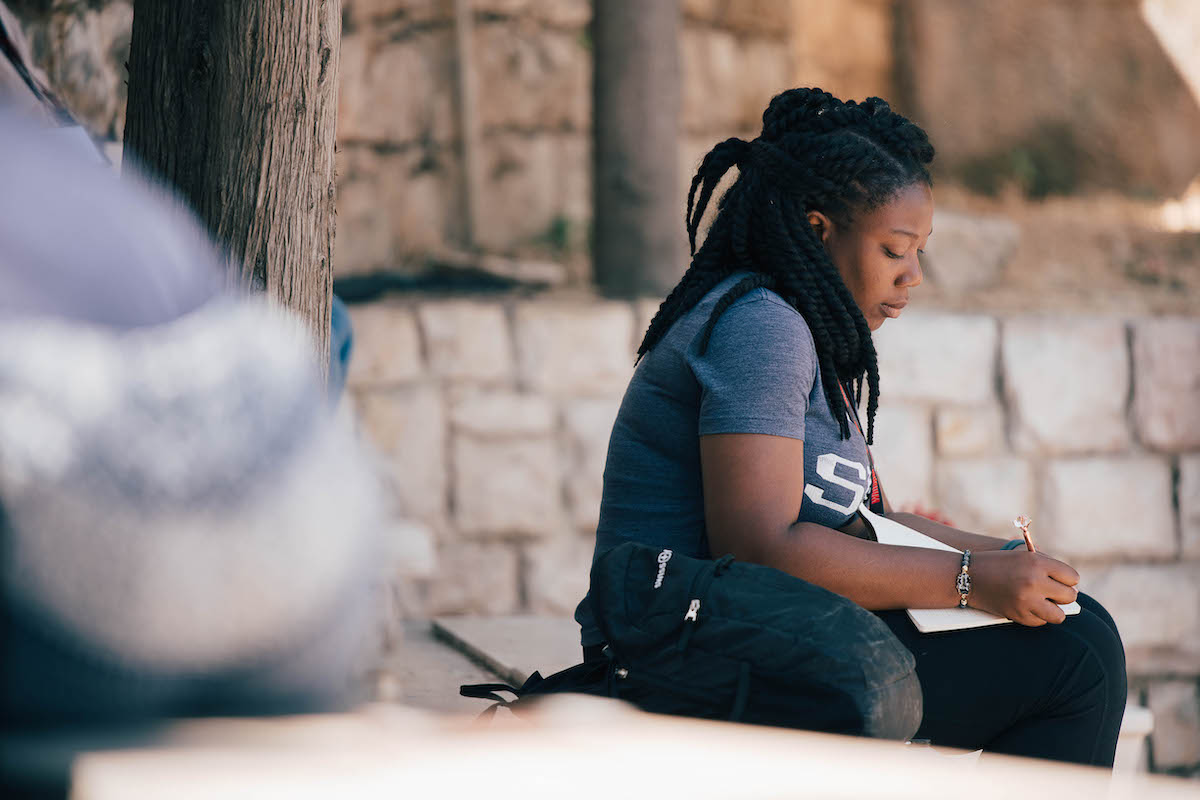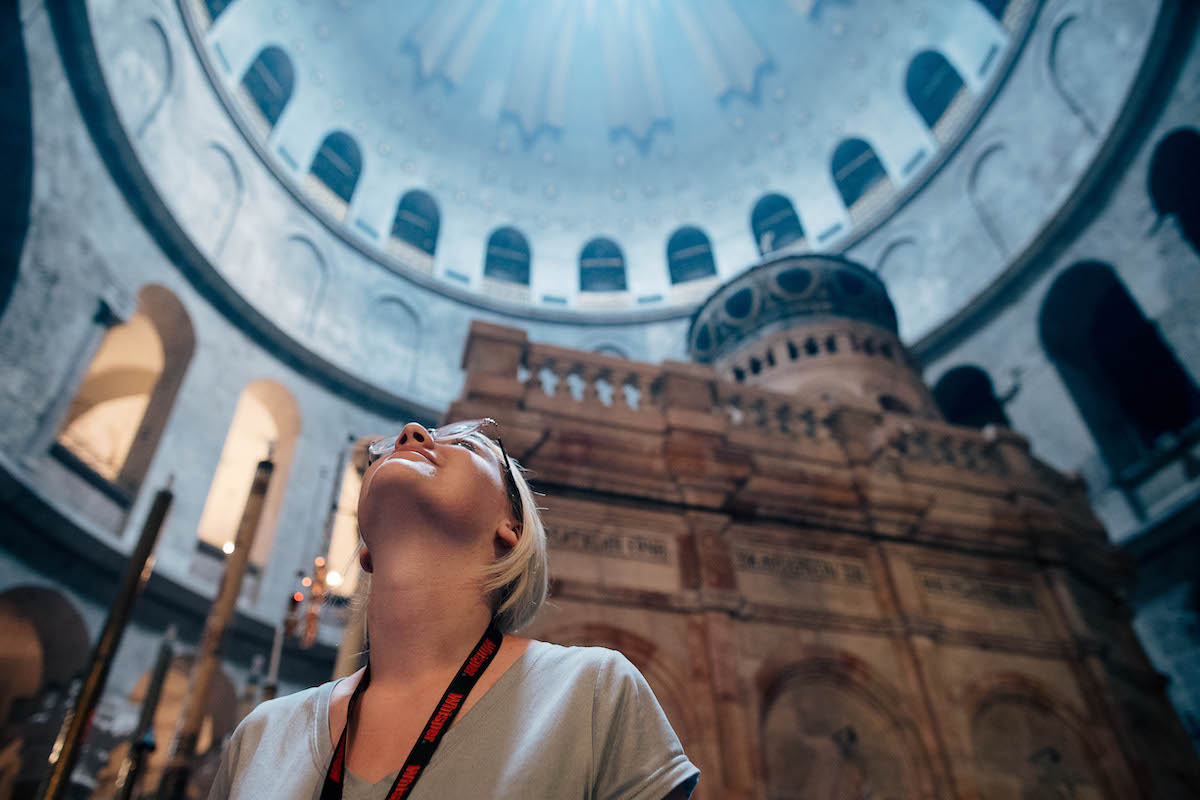Passages has brought more than 8,000 Christian college students to Israel to help them understand the roots of their faith, build lasting friendships with Jews and even celebrate Shabbat with Israeli families
Year by year, we’re trying to build bridges of friendship between Christians and Jews, says one of Passages’ vice presidents

Candlelight dances on the walls of a small one-bedroom home in Jerusalem.
A mother’s voice softly recites, “Baruch atah Adonai Eloheinu Melekh ha-olam Asher kid’shanu b’mitzvotav v’tzivanu l’hadklik ner shel Shabbat.”
“Blessed are You, Adonai our God, Ruler of the Universe, who sanctified us with your commandments and commanded us to kindle the lights of the Shabbat.”
The father rises from his seat, circling the short table to his son. Bending low, he places his hands with tender affection and reverence upon his son’s head and says, “May you be like Ephraim and Manassah.”
Turning to his daughter he lays his hands upon her head and says, “May God make you like Sarah, Rebecca, Rachel and Leah. May God bless you and protect you. May God show you favor and be gracious to you. May God show you kindness and grant you peace.”
After blessing his children, the father raises a cup of wine reciting the kiddush.
He calls his family and the 20 young Christian college students gathered around the table to remember the importance of the Sabbath.
It is a beautiful thing to behold, and just one of the ways that our organization – Passages Israel – seeks to build bridges between Christians and Jews.
WHAT IS THE MISSION OF PASSAGES ISRAEL?
As ALL ISRAEL NEWS reported in December, Passages is a non-profit organization that takes young Christian leaders on a life-changing journey to encounter the people and places of Israel. Passages equips them to understand the roots of their faith and the importance of the Jewish people, both in the Bible and today.
“Since its founding in 2015, Passages has taken some 8,000 Christian young people on such educational tours and seen encouraging results,” the article noted. “So many of those who have gone on these trips say they came home with a deeper and richer understanding of the Bible, their faith and God’s care for both Jews and Arabs. The key to the impact that Passages is the thought and care their leaders have put into designing their programs.”
That’s true.

We believe the best way for Christian college students to truly understand why Israel and the Jewish people are important to God – and thus should be important to them – is for them to come and see the people and land for themselves. It makes the Bible come alive in ways that a small group Bible study or campus minister’s message may not.
And celebrating Shabbat with a Jewish Israeli family is an essential element of our tours.
For thousands of years, after all, Jews from all over the world have paused on the seventh day of the week to observe God’s command to rest and celebrate through a family meal.
Jesus, a Jewish man, himself participated in over 1,700 Shabbat meals in his lifetime.
Most of his modern followers rarely, if ever, observe this practice.
But giving Christian young people an opportunity to experience something that Jesus and his disciples did as Jews living in Israel is a great way to help them better understand the Jewish roots of their faith.

A HISTORY OF TENSION AND TRAGEDY
Yet helping Christians understand the blessings that come from Jewish history and traditions as recorded in the Bible – and still practiced today by many Jews – is not enough.
Christians also need to understand the tension and tragedy of Christian-Jewish relations.
Too often throughout history, the relationship between those who bear the name of Jesus (Christians), and Jesus’ ethnic Jewish brothers and sisters, have been torn by slander, hate, and sword since the days of the early Church.
We cannot deny this reality, nor should we ignore it.
Rather, at Passages we encourage young Christians to learn from this history and seek to build healthier, warmer, more compassionate relations with Israel and the Jewish community.
Two years after Christianity attained imperial status under Emperor Constantine in 313 AD, the Roman leader decreed that anyone who was caught preaching the merits of Judaism to Christians would be burned alive.
At the Council of Nicaea in 325, Christians were forbidden to celebrate Easter at the same time as Passover.
In 423, Theodosius II outlawed the construction of Jewish synagogues and throughout the Byzantine Empire. Countless Jewish homes were destroyed and church leaders confiscated synagogues to be used as churches.
Under Justinian in 546, Christians were prohibited from publicly reading translations of the Bible in Aramaic, Greek or Hebrew. Additionally, Jewish commentaries and the Talmud were outlawed for Christian engagement.
THE CRUELTY OF THE CRUSADES
The Crusades provided a platform for open violence against Jewish communities.
As crusaders traveled from Europe to the Holy Land, they were inspired by Christian leaders like Peter of Cluny, who said, “Why should we seek the enemies of Christ in distant lands when the blasphemous Jews live among us?”
Some bishops attempted to safeguard Jews and provide them shelter from the ensuing violence, but flourishing Jewish communities in cities like Mainz, Worms, Trier, Cologne and Strasbourg were utterly destroyed.
Jewish people who refused Christian baptism were systematically murdered, and others committed suicide.
Later in 1215, at the Fourth Lateran Council, Pope Innocent III decreed Jews should wear particular clothing, conical hats and yellow circular badges, to distinguish them from the Christian population. During this period, other Christian clergy – picking up the cause of Justinian – outlawed the public use of the Talmud and even placed the book on trial in 1240, which resulted in a public book burning.
When the Black Plague killed upwards of 50% of the European population from 1347–50, the Jews were widely blamed.
Pope Clement VI attempted to stop the violence toward the Jews by issuing a statement declaring that the Jews were dying from the plague just like the Christians. Unfortunately, his words did not halt the Christian violence against the Jews.
THE HEART-BREAKING ANTI-SEMITISM OF MARTIN LUTHER
Some clergy during the Protestant Reformation were loving and sympathetic towards the Jewish people.
Yet others such as the movement’s founder – Martin Luther – began with loving hearts towards Jews but became frustrated that the Jews would not embrace Jesus as Messiah and become baptized Christians in the new movement.
In the latter years of his life, Luther published two pamphlets entitled “Letter against the Sabbathists” and “The Jews and Their Lies.” Unfortunately, these two works resurfaced the same anti-Semitic tropes used before among Christian clergy, accusing the Jews of murdering children, poisoning wells and desecrating the Eucharistic Host.
Many believe the forced relocation of Jews into particular neighborhoods called ghettos began with the Nazis; however, Jewish ghettos were established as early as the 16th century in Rome, Lyon, Vienna, Frankfurt, Valencia and other major cities.
In 1873, the term “anti-Semitism” was coined in a German family magazine by Wilhelm Marr, who suggested the Jews were responsible for all kinds of financial theft.
THE CRIMES OF THE HOLOCAUST
In the 20th century, Jews from all over the world were blamed for the financial crash. In the United States, rampant anti-Semitism was the norm. The Ku Klux Klan most notably popularized anti-Semitism with 5 million members in the 1920s.
The Christian church’s discrimination toward the Jews was the foundation of state-sponsored anti-Semitism.
Even before Nazi Germany’s genocidal murder of over 6 million Jews, other European countries, specifically Romania and Hungary, had political parties matching Hitler’s extreme propaganda.
In the aftermath of World War II, many desperate Jewish survivors fled to the land of Israel – territory known under the Ottoman Empire as “Palestine” – seeking a place of peace, refuge, and self-determination, hoping and praying to never again be helplessly slaughtered.
There they established a home for all Jewish people, a haven from discrimination and violence that had chased them since the Romans destroyed Jerusalem in 70 AD.
A LOVING AND FAITHFUL REMNANT
Were there true followers of Jesus Christ during all of these seasons who obeyed their Lord’s command – and example – to love their Jewish neighbors?
Absolutely.
Were there Christians during all these seasons who showed kindness and respect towards the sons and daughters of Abraham, Isaac, and Jacob, even if they didn’t agree with the Jewish people about who Jesus is?
Absolutely – there has always been a loving remnant, faithful to the true teachings of the New Testament and thus grateful for and protective of the Jewish people.
These are important stories, too.
Still, it is important for Christian students to know that for nearly 2,000 years, far too many people calling themselves “Christians” ostracized or struck out in violence toward their Jewish neighbors, even though both Christians and Jews share holy scriptures and spiritual heritage.

YOUNG PEOPLE NEED TO DISCOVER THE JEWISH ROOTS OF CHRISTIANITY
At the same time, Christian young people need to truly discover that Jesus, the central figure of the Christian faith, was an exemplary Jew.
He followed the laws of Moses.
He lived in light of the promises given to the patriarchs.
He cherished the Jewish people as “sheep without a shepherd.”
He wept for the city of Jerusalem days before his execution and resurrection.
And even while he was being crucified, he asked his Father in heaven to forgive those responsible, “for they know not what they do.”
Such truths are of immense importance to the faith of all Christians.
But how will young believers know any of this unless they are taught it – and what better place than in Israel itself?
They need to know that some Christians have sought to build bridges of friendship with the Jewish people in recent decades to heal this wounded past.
Others, however, have turned their backs on the Jewish people, and against the State of Israel, declaring Jews do not have the right to self-determination or statehood.
Because of these complexities, is it surprising that many Jewish people remain extremely suspicious of Christian friendship?
THE POWER OF A RECENT PASSAGES TRIP TO ISRAEL
In light of this troubled history and on-going friction between these two communities, something genuinely beautiful occurred on Jan. 3, 2020.
Nearly 1,000 Christian college students celebrated Shabbat alongside Jewish families in Jerusalem.
First, they traveled to the Western Wall to welcome the arrival of Shabbat.
Many sang and prayed at this historic place surrounded by thousands of Jews offering prayers to God and singing the Psalms in rhythmic unison.
One Passages participant wrote to us saying:
“I remember standing beside my participants at the Kotel during Shabbat, with our hands on the wall in silent prayer. I remember looking up to my left and right, only to find the moment to be particularly empowering . . . . I looked behind my shoulder and saw a multiplicity of people from diverse backgrounds eagerly worshiping or waiting to worship. Truly, this passage of my life was unforgettable.”
Then, these students shared in a family Shabbat dinner and learned of this rich biblical heritage instituted long ago.
Another participant, reflecting upon this experience, told us, “The centuries of history weren't just lines on a plaque in front of ruins. They could be seen in the eyes of my tour guide as he spoke about his country and could be felt in the kind smiles of the Jewish family who welcomed us into their home for Shabbat. This trip didn't just give me new things to see; it showed me a new way to see.”
I love such testimonies.
They tell me that Passages Israel is uniquely connecting with young Christian leaders to the roots of their faith by helping them encounter Israel.
We aren’t wringing our hands about the future of our young people.
We are working to build bridges of friendship and understanding between young Christian leaders and the Jewish people who recognize this troubled past yet yearn for – and also want to work towards – a better tomorrow.
I am hopeful for this new generation of Christian leaders.
While they can never undo the terrible traumas of the past, I believe their Passages experience will help them understand the depth of God’s care for the Jewish people and chart a far better future.

Luke Bray, Th.M., Ph.D., is the Vice President of Strategic Partnerships and Growth for Passages Israel, a non-profit organization that has brought more than 8,000 Christian college students to the Holy Land to learn about Israel, the Jewish people, the Palestinians, and understand God’s care for both peoples as explained in the Bible.














